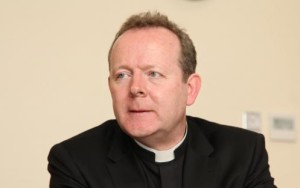
By Sarah Mac Donald - 23 October, 2014
 The Primate of All Ireland has called for the building afresh of mutual respect and trust between the Church and the media in Ireland.
The Primate of All Ireland has called for the building afresh of mutual respect and trust between the Church and the media in Ireland.
Speaking at the 2014 Radharc Trust awards ceremony on Wednesday, Archbishop Eamon Martin said this mutual respect and trust should not be fawning or deferential but rather a recognition that the Church and media share similar goals – to seek out the truth and highlight injustice.
“In many ways we have a common mission – vocation even – to interact with society and the world in order to promote truth, ask hard questions, multiply goodness, enhance beauty and to serve the common good,” the Archbishop, who is chair of the Council for Communications of the Irish Catholic Bishops’ Conference told the assembled film and documentary makers.
The Primate said he recognised that the coverage of the child abuse scandals in the Church had “fundamentally shifted” the Church’s relationship with the media.
Most now accept that the media had played “a vitally important role” in Ireland and around the world “in lifting the lid on a terrible and shameful chapter of our history; giving a voice to those who for years had been carrying a lonely trauma.”
He said media attention on these issues had accelerated the development and implementation of best practice in safeguarding, both in the Church and throughout society.
However, Dr Martin admitted that some in the Church “have sometimes reacted defensively or in denial to legitimate criticism in the media”.
But he also highlighted that some commentators, particularly on social media, “seem at times to have lost the ability to objectively question a story, running instead with their consensus caricature of the Church.”
The Archbishop of Armagh said the Catholic Church remains of great interest to the media today, perhaps even more so than in the early days of Radharc.
“Because the Church is often counter-cultural, and a sign of contradiction in the secular world, it can be an object of fascination to many, of bewilderment or curiosity to others, and of hostility to some.”
He added, “There is, of course, a legitimate interest in reporting bad as well as good news about the Church.”
Paying tribute to the values and ethos of Radharc, he regretted that he hadn’t had the opportunity to properly meet Fr Joe Dunn and have a conversation with him about his film work and hear his opinions about Church and the media.
“I am grateful for the quality and extent of programmes made by Joe and the Radharc ‘squad’ which is preserved in the Radharc archive,” he said.
The head of the Church in Ireland also paid tribute to Radharc saying it was probably the most significant media achievement of the Church in Ireland in the 20th century.
“It was, in effect, Ireland’s first independent television production company,” and he reminded his listeners that the early days of Radharc coincided with the beginning of broadcasting by RTÉ television, and with the Second Vatican Council.
He underlined that what Radharc did so well was to “present the beautiful, edifying and spiritually-inspiring lives of people of faith in ways which reflected the beauty and goodness of God.”
Through Radharc, a whole spectrum of contemporary issues was beamed into the living rooms of Ireland: issues of human rights, injustice, and persecution, the plight of Irish emigrants, the courage of our missionaries, and the struggles against oppression throughout the world, Archbishop Martin said.
“Radharc was radical and, by any standard, its library of films is a magnificent accomplishment” the Communications Chairman said and added that the Radharc squad were like “missionaries” offering a commentary, in the light of Gospel values and Catholic social teaching, on what Ireland and the world were really like and were becoming.
“Their approach to the involvement of Church in the media, was pioneering for its time, but also prophetic in what it says to us today.”
“I believe that today, when so many people are tempted to despair, we need to rediscover the Radharc vision and lift people up, giving them, as Saint Peter put it, “a reason for the hope that lies within us.”
“With so much conflict, hatred and division in the world, it would do all our hearts good to witness the commitment of people of faith to peace and justice, to love and understanding.”
He added that film and documentary-makers working in the spirit of Radharc should realise the importance of integrity in their work and their responsibility to truth.
Recalling that Radharc means ‘view’ or ‘vision’, the Archbishop said it is time “to find a new vision for harnessing communications technologies in order to bring the joy of the Gospel to the world.”
“The spirit of Radharc is alive and well in Pope Francis!”
He recalled the Pope’s words on World Communications Day when he said: “The Church needs to be concerned for, and present in, the world of communication, in order to dialogue with people today and to help them encounter Christ. She needs to be a Church at the side of others, capable of accompanying everyone along the way. The revolution taking place in communications media and in information technologies represents a great and thrilling challenge; may we respond to that challenge with fresh energy and imagination as we seek to share with others the beauty of God.”
Archbishop Martin said that in his opinion “a really good documentary should not only inform and entertain but also, where necessary, shine a light into dark places.”